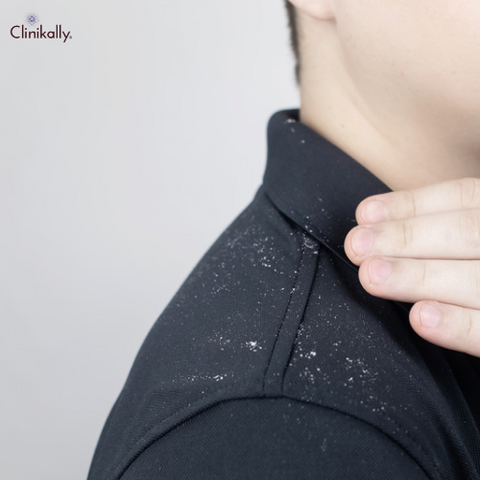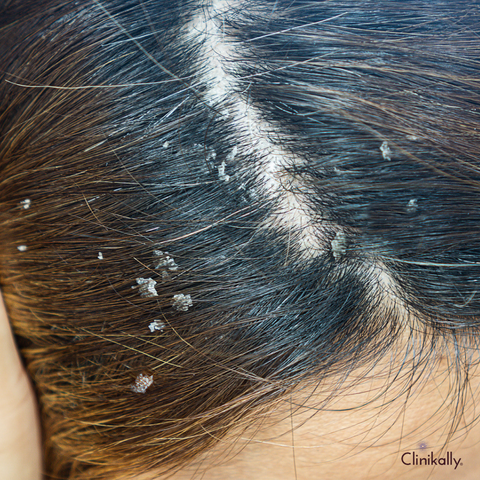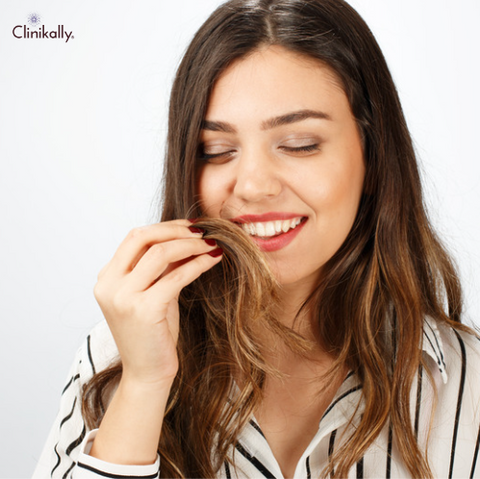Zinc pyrithione is an active ingredient commonly found in anti-dandruff shampoos, conditioners, and other hair care products. It is known for its ability to fight dandruff and promote a healthy scalp.
It has the ability to inhibit the growth of yeast, which is a major cause of dandruff. If you're struggling with dandruff or other scalp issues, look for hair care products containing zinc pyrithione to help alleviate your symptoms and promote a healthy scalp. Here we will look into the benefits of zinc pyrithione for hair and how you can use it to reduce dandruff and promote healthy scalp.
What is Zinc Pyrithione?

Zinc Pyrithione (ZPT) is an active ingredient commonly used in anti-dandruff shampoos and personal care products to treat scalp conditions such as seborrheic dermatitis and psoriasis. It is a coordination complex of zinc that contains pyrithione, a biocide with antibacterial and antifungal properties. ZPT works by slowing down the growth of skin cells and reducing the production of yeast, which is a major contributor to dandruff and other scalp conditions. It also has mild anti-inflammatory properties that help to reduce redness and itching on the scalp.
In addition to its use in personal care products, zinc pyrithione is also used as an industrial biocide to control the growth of algae and other microorganisms in water-based systems such as paints, coatings, and adhesives.
How Does Zinc Pyrithione Work?
Zinc pyrithione works by targeting the fungus Malassezia, which is a common cause of dandruff and other scalp conditions. Malassezia is a type of yeast that naturally lives on the scalp and feeds on oils secreted by the hair follicles. Zinc pyrithione works by disrupting the cell membranes of Malassezia, causing it to die off and reducing its ability to reproduce. In addition to its antifungal properties, zinc pyrithione also has antibacterial properties that help to eliminate the bacteria that can contribute to scalp odour.
Zinc pyrithione also has mild anti-inflammatory properties that help to reduce redness and itching on the scalp. It works by inhibiting the production of cytokines, which are proteins that contribute to inflammation and can cause itching and flaking. Overall, zinc pyrithione works by controlling the growth of yeast and bacteria on the scalp, reducing inflammation, and promoting a healthier scalp environment. This helps to reduce the symptoms of dandruff and other scalp conditions and improve the overall appearance and health of the hair and scalp.
Zinc Pyrithione for Hair: Benefits and Uses

Zinc Pyrithione is an active ingredient commonly found in anti-dandruff shampoos and is known for its ability to effectively combat dandruff and other scalp issues. But it has many other benefits for hair as well. Here are some of the benefits and uses of Zinc Pyrithione for hair:
Controls Dandruff: Zinc Pyrithione is primarily used to control dandruff, which is caused by an overgrowth of a type of yeast called Malassezia on the scalp. Zinc Pyrithione helps to slow down the growth of this yeast, reducing the amount of dandruff on the scalp.
Soothes Scalp Irritation: Zinc Pyrithione has anti-inflammatory properties that can help to soothe an irritated or itchy scalp. This makes it an effective ingredient for those with sensitive scalps.
Promotes Hair Growth: Zinc Pyrithione can also help to promote hair growth by reducing inflammation and providing a healthy environment for hair follicles to grow.
Fights Hair Loss: Zinc Pyrithione can help to fight hair loss by reducing the inflammation in the scalp that can lead to hair shedding.
Improves Hair Texture: Zinc Pyrithione can help to improve the texture and appearance of hair by removing build-up and excess oil from the scalp, which can weigh down hair and make it look dull.
Suitable for All Hair Types: Zinc Pyrithione is safe for use on all hair types, including color-treated hair, as it is a gentle yet effective ingredient.
Overall, Zinc Pyrithione is an effective ingredient for promoting a healthy scalp and hair growth, making it a great choice for those dealing with dandruff, hair loss, or other scalp issues.
Fighting Dandruff
Dandruff is a common condition that causes flaky and itchy scalp. It is caused by the overgrowth of a yeast-like fungus called Malassezia. Here are some tips to help fight dandruff:
-
Use an anti-dandruff shampoo: Look for shampoos that contain ingredients such as salicylic acid, ketoconazole, or selenium sulfide, which can help control dandruff. Use the shampoo at least twice a week, or as directed by your doctor.
-
Brush your hair regularly: Brushing your hair regularly helps to distribute the natural oils on your scalp and prevent dandruff.
-
Manage stress: Stress can worsen dandruff, so try to manage your stress levels. You can try relaxation techniques such as deep breathing, yoga, or meditation.
-
Eat a healthy diet: A healthy diet rich in vitamins and minerals can help promote a healthy scalp. Include foods such as fruits, vegetables, whole grains, and lean protein in your diet.
-
Avoid using hair styling products: Hair styling products such as gels, hairsprays, and mousses can irritate your scalp and worsen dandruff. Try to avoid using them or use them in moderation.
-
Get enough sleep: Lack of sleep can affect your overall health, including your scalp health. Aim for 7-8 hours of sleep per night.
If you have severe dandruff or if the above tips do not improve your condition, consult a dermatologist for further evaluation and treatment.
Treating Seborrheic Dermatitis
Seborrheic dermatitis is a common skin condition that causes red, itchy, and flaky patches on the scalp, face, and other areas of the body. It is caused by an overgrowth of yeast on the skin, and it tends to be more common in people with oily scalp or skin, hormonal imbalances, or a weakened immune system. Here are some tips to help treat seborrheic dermatitis:
Use an anti-fungal shampoo: Look for shampoos that contain ingredients such as ketoconazole, selenium sulfide, or pyrithione zinc. Use the shampoo as directed by your doctor or at least twice a week.
Use a topical cream: Topical creams containing corticosteroids, antifungal agents, or calcineurin inhibitors can help reduce inflammation and itching.
Avoid triggers: Avoiding triggers such as stress, cold weather, and harsh chemicals can help reduce flare-ups.
Moisturize: Applying a gentle, fragrance-free moisturizer can help soothe dry, itchy skin and prevent flare-ups.
Manage stress: Stress can trigger or worsen seborrheic dermatitis, so try to manage your stress levels. You can try relaxation techniques such as deep breathing, yoga, or meditation.
Maintain good hygiene: Keeping your skin clean and dry can help prevent the growth of yeast and bacteria that can worsen seborrheic dermatitis.
If your seborrheic dermatitis is severe or does not improve with home remedies, consult a dermatologist for further evaluation and treatment. They may prescribe a stronger medication, such as oral antifungal medications or phototherapy.
Promoting Healthy Scalp
A healthy scalp is important for maintaining healthy hair growth and preventing scalp problems such as dandruff, seborrheic dermatitis, and hair loss. Here are some tips to promote a healthy scalp:
-
Keep your scalp clean: Wash your hair regularly with a gentle shampoo to remove dirt, oil, and product build-up from your scalp. However, avoid over-washing your hair, as this can strip your scalp of its natural oils.
-
Use a gentle shampoo: Choose a shampoo that is free of harsh chemicals such as sulphates and parabens, which can irritate your scalp and cause dry scalp and itching.
-
Massage your scalp: Massaging your scalp can help improve blood circulation and stimulate hair growth. Use your fingertips to gently massage your scalp for a few minutes before washing your hair.
-
Avoid tight hairstyles: Avoid tight hairstyles such as braids, ponytails, and buns, which can pull on your scalp and cause hair loss and damage.
-
Protect your scalp from the sun: Like your skin, your scalp can be damaged by the sun's UV rays. Wear a hat or use a hair product with SPF to protect your scalp.
-
Eat a healthy diet: A healthy diet rich in vitamins and minerals can help promote a healthy scalp. Include foods such as fruits, vegetables, whole grains, and lean protein in your diet.
-
Manage stress: Stress can affect your overall health, including your scalp health. Try to manage your stress levels through relaxation techniques such as deep breathing, yoga, or meditation.
By following these tips, you can help promote a healthy scalp and maintain healthy hair growth. If you experience any scalp problems or hair loss, consult a dermatologist for further evaluation and treatment.
How to Use Zinc Pyrithione for Hair Care

Zinc pyrithione is a common ingredient in many hair care products due to its effectiveness in treating dandruff and other scalp conditions. Here are some tips on how to use it for hair care:
-
Choose the right product: Look for shampoos or conditioners that contain zinc pyrithione as an active ingredient. Make sure to read the label to ensure the product is intended for hair care use.
-
Apply to wet hair: Wet your hair thoroughly before applying the product. Massage it gently into your scalp, focusing on the areas that are particularly dry or itchy.
-
Leave on for a few minutes: Let the product sit on your scalp for at least 2-3 minutes before rinsing it off. This allows the zinc pyrithione to penetrate the scalp and work its magic.
-
Rinse thoroughly: Rinse your hair thoroughly with warm water to remove all traces of the product.
-
Use regularly: To see the best results, use the product regularly as directed on the label. Over time, you should notice a significant improvement in the health of your scalp and hair.
It's important to note that while zinc pyrithione can be effective for treating dandruff and other scalp conditions, it can also cause dryness or irritation in some people. If you experience any discomfort or unusual symptoms, discontinue use and consult a dermatologist or healthcare professional.
Choosing the Right Shampoo and Conditioner
Choosing the right shampoo and conditioner can be overwhelming with the wide variety of options available in the market. Here are some tips to help you choose the right shampoo and conditioner for your hair:
-
Determine your hair type: Knowing your hair type is important in choosing the right shampoo and conditioner. Is your hair curly, straight, fine, thick, oily, dry, or a combination of these? Different hair types require different formulas to keep them healthy and looking their best.
-
Look for natural ingredients: Shampoos and conditioners with natural ingredients like aloe vera, coconut oil, and shea butter are great options as they are gentle on your hair and scalp. Avoid products with harsh chemicals like sulphates, parabens, and phthalates that can damage your hair.
-
Consider your hair concerns: If you have specific hair concerns like dandruff, hair loss, or color-treated hair, look for shampoos and conditioners that are specifically formulated for those issues. They may contain ingredients like tea tree oil, biotin, or UV protectants to address those concerns.
-
Choose a reputable brand: Choose a brand that has a good reputation for producing quality hair care products. Read reviews and ask for recommendations from friends and family to find a brand that suits your needs.
-
Test the product: If possible, try a small sample of the product before committing to a full bottle. This can help you determine if the shampoo and conditioner work well with your hair and if you like the scent and texture.
Remember, everyone's hair is unique, so what works for someone else may not work for you. Be patient and experiment until you find the right shampoo and conditioner for your hair type and concerns.
Tips for Treating Dandruff and Seborrheic Dermatitis
Dandruff and seborrheic dermatitis are common scalp conditions that can be uncomfortable and embarrassing. Here are some tips for treating dandruff and seborrheic dermatitis:
-
Use a medicated shampoo: Look for a shampoo that contains active ingredients like zinc pyrithione, coal tar, salicylic acid, or ketoconazole. These ingredients can help control the growth of yeast and fungus on the scalp that contribute to dandruff and seborrheic dermatitis.
-
Wash your hair regularly: Regular washing can help remove excess oil and dead skin cells from your scalp, which can contribute to dandruff and seborrheic dermatitis. Aim to wash your hair at least twice a week, or as often as needed to keep your scalp clean and healthy.
-
Avoid harsh hair products: Hair products like hair sprays, gels, and mousses can irritate your scalp and contribute to dandruff and seborrheic dermatitis. Opt for gentle, fragrance-free products instead.
-
Manage stress: Stress can trigger or worsen dandruff and seborrheic dermatitis. Try to manage your stress levels by practicing relaxation techniques like meditation, yoga, or deep breathing exercises.
-
Eat a healthy diet: Eating a diet rich in vitamins and minerals can help keep your scalp healthy and reduce the risk of dandruff and seborrheic dermatitis. Eat plenty of fruits, vegetables, lean protein, and whole grains.
-
Seek medical advice: If your dandruff or seborrheic dermatitis is severe or persistent, or if you develop other symptoms like redness, swelling, or itching, consult a dermatologist. They can prescribe medicated shampoos or other treatments to help manage your condition.
Best Zinc Pyrithione Hair Care Products

There are a variety of hair care products that contain zinc pyrithione as an active ingredient. Here are some of the best zinc pyrithione hair care products available in the market:
-
8X Shampoo
-
C Win Shampoo
-
Scalpe Plus Expert Anti-Dandruff Shampoo
-
Blue Cap Shampoo
When using these products, it's important to follow the instructions on the label and use them as directed. If you have any concerns or questions, consult a dermatologist or healthcare professional.
Top Zinc Pyrithione Shampoos
Zinc pyrithione is an effective ingredient for treating dandruff, seborrheic dermatitis, and other scalp conditions. Here are some of the top zinc pyrithione shampoos:
-
8X Shampoo: With 8X shampoo, you can fight dandruff-causing microorganisms and prevent their spread and growth. It is an anti-dandruff medication that is used to treat dandruff.
-
C Win Shampoo: C Win Shampoo is an anti-dandruff shampoo used to treat dandruff. It inhibits the spread and growth of dandruff-causing microorganisms. It regenerates skin cells and aids in the removal of dandruff from the hair.
-
Scalpe Plus Expert Anti Dandruff Shampoo: Scalpe Plus Expert Anti Dandruff Shampoo prevents itching and flaking of the scalp and treats scaly scalp.
-
Blue Cap Shampoo: The Blue Cap Shampoo soothes scalp irritation and eliminates flaking and greasy scales. It regulates the activity of skin cells on the scalp and promotes hair growth.
When using these shampoos, it's important to follow the instructions on the label and use them as directed. If you have any concerns or questions, consult a dermatologist or healthcare professional.
Top Zinc Pyrithione Conditioners
While shampoos are designed to cleanse the scalp and hair, conditioners are formulated to provide moisture and nourishment to the hair strands. Here are some top zinc pyrithione conditioners available in the market:
-
Root Deep Conditioner: Root Deep Conditioner is a fortifying conditioner that has been shown to strengthen weak, undernourished hair shafts and improve hair manageability without build-up.
-
Renocia Hair Revitalizing Conditioner: Renocia Hair Revitalizing Conditioner nourishes the hair from the roots to the tips for maximum protection. It helps with hair loss, hair thinning, dandruff, and other scalp problems. Renocia Conditioner keeps hair lush, glossy, bouncy, and shiny while protecting it from pollutants and dust. The conditioner contains peptides that feed the hair and promote hair growth.
When using these conditioners, it's important to apply them evenly to the hair strands, avoiding the scalp. Leave the conditioner on for a few minutes before rinsing thoroughly with water. If you have any concerns or questions, consult a dermatologist or healthcare professional.
Other Zinc Pyrithione Hair Treatments
Apart from shampoos and conditioners, there are other zinc pyrithione hair treatments available in the market. Here are some options:
-
Zinc Pyrithione Leave-In Scalp Treatment: This type of treatment is applied directly to the scalp and left in without rinsing. It helps to control dandruff, reduce itching, and soothe an irritated scalp.
-
Zinc Pyrithione Hair Masks: Hair masks containing zinc pyrithione are designed to provide intensive treatment to the hair and scalp. They help to moisturize and nourish hair, while also controlling dandruff and reducing inflammation.
-
Zinc Pyrithione Scalp Serums: Scalp serums containing zinc pyrithione are lightweight and easy to apply. They help to control dandruff, reduce scalp irritation, and promote healthy hair growth.
-
Zinc Pyrithione Hair Sprays: Hair sprays containing zinc pyrithione are designed to provide a quick and easy solution to dandruff and scalp irritation. They can be applied directly to the scalp and hair, and are perfect for on-the-go use.
When using any zinc pyrithione hair treatment, it's important to read the instructions on the label and follow them carefully. Some treatments may need to be left on for a certain amount of time before rinsing, while others can be left in without rinsing. It's also important to patch test the product before use to ensure you are not allergic to any of the ingredients. If you have any concerns or questions, consult a dermatologist or healthcare professional.
When to See a Dermatologist for Scalp Issues
If you have persistent scalp issues that do not respond to over-the-counter treatments, it's a good idea to see a dermatologist. A dermatologist is a medical professional who specializes in the diagnosis and treatment of skin, hair, and nail conditions. They can provide a proper diagnosis and recommend a treatment plan tailored to your specific needs.
Here are some signs that you should see a dermatologist for your scalp issues:
-
Severe or persistent itching or flaking: If you have severe or persistent itching or flaking, it may be a sign of a more serious condition such as psoriasis or seborrheic dermatitis.
-
Scalp redness or tenderness: If your scalp is red, tender, or inflamed, it could be a sign of an infection or other underlying condition.
-
Hair loss: If you are experiencing hair loss in addition to scalp issues, it's important to see a dermatologist. Hair loss can be a symptom of many conditions, including alopecia areata, which requires specialized treatment.
-
Open sores or scabbing: If you have open sores or scabbing on your scalp, it could be a sign of a bacterial or fungal infection.
-
Previous treatment failures: If you have tried over-the-counter treatments for your scalp issues and have not seen any improvement, it's time to seek professional help.
A dermatologist can provide a thorough evaluation of your scalp condition and recommend the best treatment options for you. They can also help you manage any underlying conditions that may be contributing to your scalp issues.
Final Thoughts on Zinc Pyrithione for Hair

Zinc pyrithione is a common active ingredient in hair care products designed to treat dandruff and other scalp conditions. It is effective in controlling the growth of Malassezia, a yeast that can contribute to dandruff and other scalp issues. Zinc pyrithione has been extensively researched and is generally safe for use in hair care products. When choosing a zinc pyrithione shampoo or conditioner, it's important to consider your specific hair and scalp needs. Look for products that contain the appropriate concentration of zinc pyrithione for your needs, and consider additional ingredients that can provide added benefits, such as moisturizing agents, natural oils, or vitamins.
If you have persistent scalp issues that do not respond to over-the-counter treatments, it's a good idea to see a dermatologist. A dermatologist can provide a proper diagnosis and recommend a treatment plan tailored to your specific needs.
Overall, zinc pyrithione can be an effective ingredient in hair care products for controlling dandruff and promoting a healthy scalp. With proper use and care, it can help you maintain healthy, manageable hair.
































